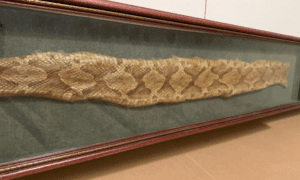I thought a good thing for us to do together here in my article today in the “lazy days of summer” (I know. “Lazy?”) would be to look back into the Old Testament and remember one of the important Biblical figures before the coming of Christ.
Let’s review. That time in the Bible, “before the coming of Christ,” is called the Old Testament (O.T.). We make that distinction because, in that portion of God’s history with His people, His “testament,” which means “covenant or contract,” was based on His Law and the “contract arrangement” God had with His people. This contract or testament was that “God would give life and His Best Way of Life expressed in The Ten Commandments, and in return God could rightfully expect His people to receive that blessing and respond with obedience and faithfulness.”
God’s Old Covenant was also expressed in remembering that God saved His people from slavery in Egypt by using the blood of the perfect lamb on the doorposts. That was always remembered in celebrating “Passover.” So, we have the writings of the Old Testament from Genesis and Exodus and on through the prophets who brought God’s message to His people.
Throughout that time, however, God also promised that He would one day send His “New Testament, His New Covenant/Contract” into the world in order to bring about the full and perfect relationship between God and people – and that would be the sending of His only Son, Jesus, as the Savior of all humankind. And, in keeping His Promise as He always does, God did send Jesus, whose life, death, resurrection, ascension, and coming of His Holy Spirit did indeed “save the world” and establish God’s “New Testament, His New Covenant” based on His Grace (undeserved love) and the full right relationship with God through Jesus Christ.
We know this for sure because we hear Jesus say on the night He was betrayed, arrested, and was then to go to the cross – as He lifted the Passover Cup of wine – “This is the New Covenant in My Blood, shed for you and for all people for the forgiveness of sins.” Signed. Sealed. And Delivered! So, we have the writings of the New Testament in the Bible from the four Gospel accounts through The Revelation. And we, too, live in these “New Testament times.”
Now! We’ve said all that just to get back to the Old Testament Biblical figure we would like to “I.D.” (identify) today, the prophet Jeremiah.
Jeremiah lived and brought God’s message to His people about 600 years before the birth of Christ, so his date is 600 B.C. (six hundred years “Before Christ.”) Remember, as time moves forward in the Old Testament, the year numbers decrease because they are counting the years before and until Jesus is born. Of course all of those year designations were made long after Jesus was born and calculations were determined.
So, Jeremiah was a prophet of God who was set aside by God even before his birth to take God’s message to kings and people alike. What God had him declare was the urging for a change of heart from sinful, anti-God living, and a turn to the One True God. He declared both God’s judgment and His grace. My point in all of this is to say that his message still applies to all of us today.
When the kings, and there were five of them during the 40 years in which Jeremiah “prophesied,” along with the people maintained their sinful and anti-God living, God did indeed send His judgment upon the people. God allowed King Nebuchadnezzar and his Babylonian army to enter Judah, conquer God’s people, and take many “exiles” from their homeland to far-away Babylon to live as prisoners and slaves.
This, of course, was a terrible time for God’s people, but Jeremiah and other prophets like him kept reminding the kings and the people that it was their sinful ways that brought His judgment upon themselves. This seems very harsh and “not-so-God-like” to us, but we must remember that God has the righteous right to judge and punish, even as He has the righteous right to forgive, save, and restore. This all applies to us, as well.
Jeremiah lived in the capital city of Jerusalem during all this conquering and exile, and he saw and felt this terrible time. One interesting fact is that God did not allow Jeremiah to get married because He lovingly wanted to spare Jeremiah the pain of seeing his own family destroyed or exiled.
Throughout this ordeal, God always also gave Jeremiah His Promise of hope, salvation, and restoration. Jeremiah prophesied God’s Promise that He would bring back a “remnant” to Judah and re-build the Temple. And He did. God gave Jeremiah the message for His people that He would provide a “descendant of David” as the “Savior.” And He did. This would be, of course, Jesus. And God promised that in this Savior, He would restore His Covenant with His people. And we know that He did. And still does. Thank You, God. Amen!
[Find Kollmeyer at princeofpeacefayette.org, Sundays 9:30 Contemporary, 11:15 Traditional.]











Leave a Comment
You must be logged in to post a comment.